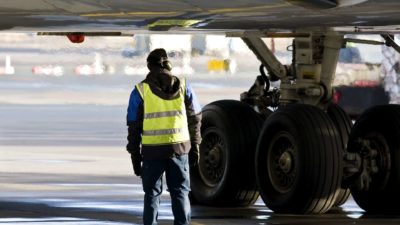The Qantas Airways Ltd (ASX: QAN) share price has been a strong performer so far in 2024.
Shares in the S&P/ASX 200 Index (ASX: XJO) airline closed out 2023 trading for $5.37. That was up from a low of $4.76 a share on 27 October.
In afternoon trade today, those same shares are swapping hands for $6.80 apiece. While that's down 0.6% in intraday trade, it sees the Qantas share price up 26.6% year to date.
For some context, the ASX 200 is up 5.9% over this same time.
Here's what could help fuel further outperformance in the months ahead.
Are tailwinds brewing for the Qantas share price?
When running my slide rule over the outlook for the Qantas share price, I like to take a step back to get a good idea of the macroeconomic picture.
And when it comes to airlines, a big part of that macro picture relates to fuel costs.
Jet fuel costs are the second biggest expense for global airlines after buying and leasing new aircraft, which are expensive.
How big an expense are we talking about?
Well, for the 12 months ending 30 June (FY 2024), Qantas reported operating expenses, excluding fuel, of $12.58 billion.
As for fuel costs, those came in at a whopping $5.32 billion over the year, slightly below FY 2024 guidance of $5.40 billion.
Looking ahead, management is forecasting a similar level of fuel expenses for the first half of FY 2025, with guidance of $2.7 billion. That's based on a forecast six-month fuel consumption of 15.6 million barrels at a jet fuel price of approximately AU$150 per barrel.
Which brings us to the unexpected glut that could support the Qantas share price into 2025.
As we reported here yesterday, global markets are facing a potential excess oil supply amid faltering demand.
On the demand side, an economic pullback in both the United States and China, the world's top two economies, could see a material decrease in energy use in the months ahead.
On the supply side, ongoing near-record crude output in the US, along with strong production from other non-OPEC+ nations like Canada and Brazil, among others, is overwhelming the voluntary supply cuts instituted by OPEC+.
Amid fears of an oil glut, Brent crude oil has plunged from US$92 per barrel in early April to US$71 today, down 23%.
Now, those lower costs won't filter through to boost the Qantas share price immediately.
As management noted:
The Qantas Group is subject to fuel price and foreign exchange risks which are an inherent part of the operations of an airline and as such, are industry-wide risks… The Qantas Group manages its fuel and foreign exchange risks through a comprehensive hedging program.
But if crude supplies continue to outpace demand and oil prices remain depressed into 2025, lower jet fuel costs should improve Qantas' bottom line.








